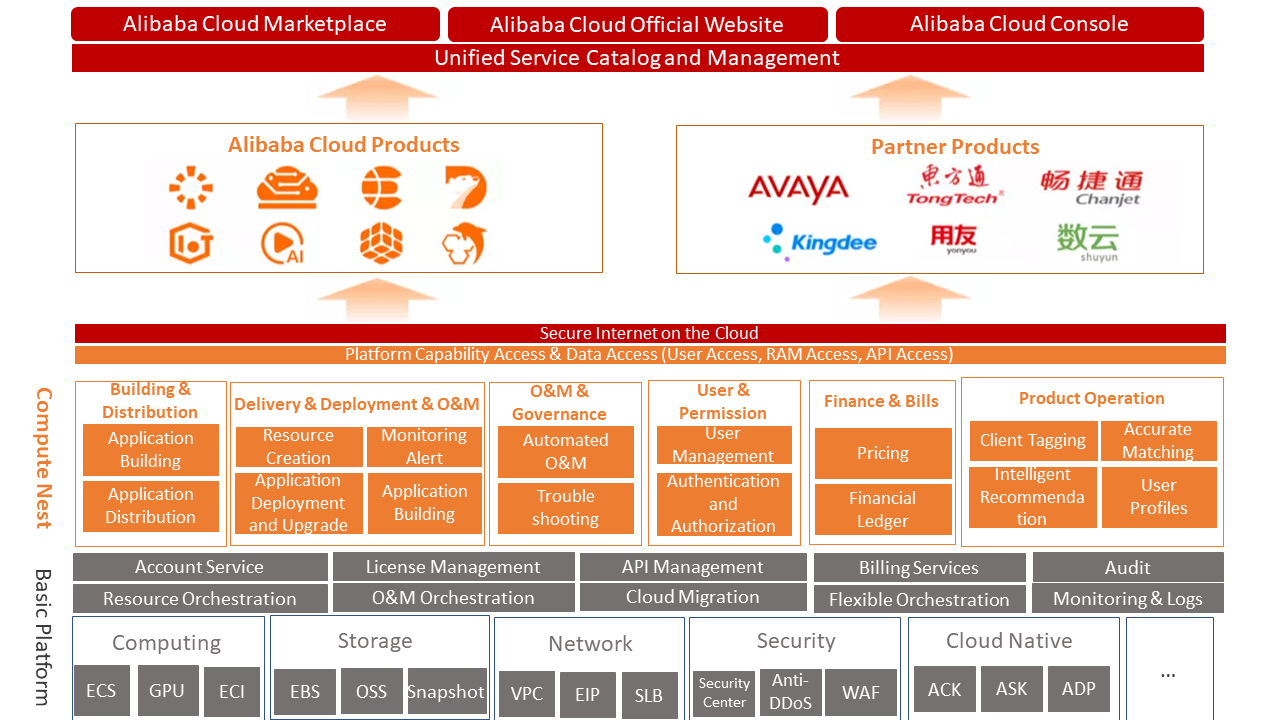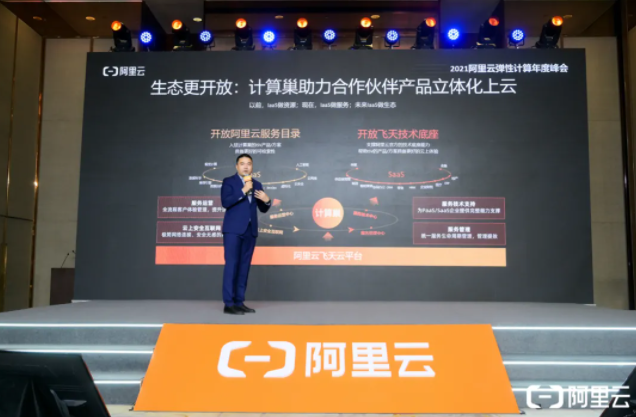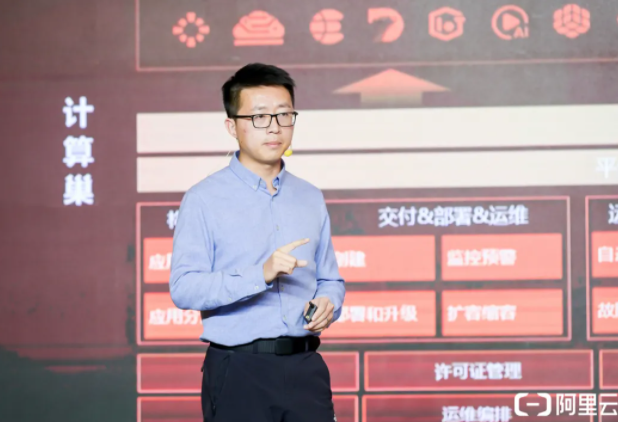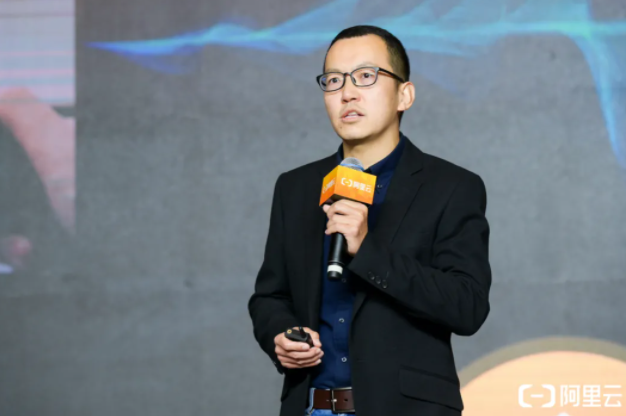By Yu Ting
Interviewees in this article: Zhang Xiantao, a researcher at Alibaba Group and Head of the Alibaba Cloud Elastic Computing; Wang Zhikun, Chief Product Officer of Alibaba Cloud Elastic Computing; He Chuan, Head of Alibaba Cloud Compute Nest. The interviewees promised that the data was true and answers were sincere.
Li Nong is the Chief Technology Officer of Avaya in Greater China, a service provider of enterprise communication and a contact center. He tells TO B New Power that the stock of Avaya has increased fivefold in recent years on account of the cloud-oriented transformation. Avaya has provided cloud services worldwide (except in China and Russia), replacing traditional software and hardware sales. Li Nong is a Senior Employee of Avaya and thinks that Chinese enterprises will also follow this path.
Among the clients Li Nong has contacted, one third do not use cloud services, one third already have a preference for cloud service providers, and the rest need cloud recommendations.
In a specific market like China, many clients have deployed applications on private clouds. How can their requirements and needs be met? This is a challenge for Li Nong. The traditional deployment method has a long cycle. Dozens of local servers involve 20 or 30 components, and Avaya must install them one by one for its clients.
In July 2021, Li Nong and his team learned about Alibaba Cloud Compute Nest for the first time. He described it by saying, "Once installed on the cloud (deployed to Compute Nest), new clients can deploy with one click as long as they provide their names and IP addresses, and more importantly, they can detect the usage of resources." This reduces implementation costs and cycles and allows IT resources to operate in new ways.
"When our clients start to use cloud services, they start to have a new choice. Compute Nest allows deployment in a pure cloud and out-of-the-box way. Clients no longer need to install 20 or 30 components one by one," Li Nong said.
The Compute Nest product Li Nong mentioned is not a brand-new product but the encapsulation of technologies and capabilities that support Alibaba Cloud's cloud products. It opens up the underlying capabilities that support Alibaba's businesses.
Alibaba Cloud Compute Nest was launched at the Alibaba Cloud Summit in Beijing in May 2021. Its purpose is to solve business challenges encountered by third-party ISVs during service cloud-based transformation. According to different business scenarios, Alibaba Cloud products and technologies are encapsulated to solve problems encountered by third-party ISVs in the comprehensive process of delivery and deployment, O&M management, re-upgrade, and customer service.
Recently, Zhang Xiantao, an Alibaba Group Researcher and Head of the Alibaba Cloud Elastic Computing product line, Wang Zhikun, Chief Product Officer of Alibaba Cloud Elastic Computing, and He Chuan, Head of Alibaba Cloud Compute Nest, were interviewed by TO B New Power on Compute Nest.

In 2019, the integrated strategy was proposed at the Alibaba Cloud Summit in Beijing. Zhang Xiantao said they were already thinking about it, “How can Alibaba Cloud open up the IaaS layer capabilities it accumulated? If Alibaba can do so, it can help some enterprise partners who are willing to transform to PaaS and SaaS to realize cloud transformation and partners who already transformed to SaaS to use cloud capabilities better. This is the embryonic form of Compute Nest they conceived.” Compute Nest was launched in mid-2021. There was a long interval in between. Zhang Xiantao said this interval was mainly used to think about and demonstrate the needs of the third-party ISVs.

Zhang Xiantao
During the launch of Compute Nest, the team communicated with Alibaba Cloud Marketplace Team and DingTalk Team, which have been developed by Alibaba Cloud for many years. Through these communications, the team attempted to define what pain points ISVs have during SaaS transformation. These pain points will be the key for Compute Nest.
Stability, scale, and security are the answers summarized by Alibaba Cloud.
For TO B, stability is the most basic requirement. Since stability is related to customer retention, it is important to choose a stable and reliable cloud platform. According to the information provided by Alibaba Cloud, Alibaba Cloud provides the highest single-machine and multi-zone SLA capabilities in the industry. SLA of a single instance reaches 99.975%, which helps provide stable SaaS services for third-party ISV partners.
Scale is also crucial to the development of enterprises. Software vendors are familiar with their software but unfamiliar with how to migrate their software to SaaS. When traditional software is deployed on the cloud, the deployment process of only virtual machines is often completed in several days or weeks. Such inefficiency hinders large-scale development.
Cloud computing technology is complex and has a learning threshold, which is a real factor. In the recently released 2021 Gartner Solution Scorecard report, Alibaba Cloud ranked first worldwide in computing, storage, network, and security at the IaaS layer. In the process of communicating with the Alibaba Cloud Team, Gartner believes that advanced capabilities, such as automated delivery of complex architectures and security capabilities, are why Alibaba Cloud is the only selected cloud vendor from China. Alibaba Cloud has opened up these capabilities through Compute Nest, which solves the large-scale development issue of service delivery and operation efficiency for third-party ISVs.
After the Data Security Law was put forward, the problem of how to share data effectively and securely has always been a headache for enterprises during cloud migration. Many enterprises know that they should implement SaaS transformation, but they still have concerns.
Many traditional ISVs have realized that the era of earning money by delivering hardware and software or services is over. At the same time, SaaS companies continue to gain high valuations. This proves that cloud-oriented transformation of software may be a must. The stability, security, and scale problems encountered during this process are handed over to IaaS service providers.
Today, it is natural for Alibaba Cloud vendors to open up PaaS capabilities, such as databases and big data products. "IaaS was a resource, is a service, and will be an ecosystem," said Zhang Xiantao during his keynote speech at the Alibaba Cloud Elastic Computing Summit.
IaaS will be an ecosystem. How does Compute Nest build an IaaS ecosystem? Zhang Xiantao said there was a big difference between Alibaba Cloud and other cloud vendors when building the Compute Nest ecosystem. Alibaba Cloud has accumulated stability, security, and complete functions at the IaaS layer and users in the past years.
First, let's discuss IaaS capabilities. Alibaba Cloud can identify faulty servers and components in advance through ultra-large-scale and intelligent fault prediction algorithms to reduce the impact of unexpected breakdowns on clients. Together, with early fault prediction technology and extreme real-time hot migration, Alibaba Cloud can help clients complete user resource migration in most scenarios.
"These capabilities have been accumulated through the services for millions of clients over the past 12 years. Alibaba Cloud provides clients with the highest single-machine and multi-zone SLA capabilities and will also help ISV partners provide stable and reliable SaaS services," said the Compute Nest Team.
Second, relying on the 12-year accumulation of Alibaba Cloud, Compute Nest can help ISVs realize cloud-oriented product transformation conveniently, which is also the core capability of Compute Nest. "Through the implementation of the underlying technology, a traditional software can be evolved into a SaaS software for delivery, which is the ability of Compute Nest in terms of core technologies." Zhang Xiantao stressed that technology was the core capability of Compute Nest, and they did a lot of work to achieve this.
As such, the third-party ISV joining Compute Nest does not have to transform its application architecture, business interface, or business model. He Chuan said, "The platform should be open and compatible with the existing products and business models of partners (third-party ISVs.) The function of Compute Nest covers almost all aspects of the whole lifecycle of an ISV serving clients, but the ISV can choose to use only the functions that are valuable to it. Compute Nest is modular and decoupled from other products, which is innovative."
Since it does not involve the transformation of products, in the process of serving Avaya, Compute Nest only provides a data package, including videos and documents and a DingTalk group that provides access support. This group is only used to answer questions and solve technical problems. He Chuan said, "We may have invested more energy in helping Avaya train their channels than in supporting access from Avaya in the early stage."

He Chuan
Third, let's discuss security capabilities. Third-party ISVs can push repair programs to users through Compute Nest or help users repair risk vulnerabilities to handle security risks quickly through proxy under user authorization. In addition, Compute Nest encapsulated all ISV service scenarios and implemented authorization with one click, which is safe and convenient. He Chuan said that these scenes were experiences they have summed up in the process of cooperating with various partners in the past. They have developed product capabilities based on that experience so that all Alibaba Cloud partners can use them.
Finally, as a first-mover cloud computing vendor, Alibaba Cloud has accumulated millions of users, which allows third-party ISVs to be deeply integrated into the Alibaba Cloud Service Catalog. After joining Compute Nest, the "Integration of Cloud and DingTalk" mode will make it easy for these ISVs that want to deploy their SaaS products on the DingTalk platform to join the DingTalk ecosystem.
To sum up, Compute Nest is like a 4S store for the cloud-oriented transformation of enterprise applications, which solves the problems of Stability, Security, Scale, and Sale during the process. In essence, it provides a cloud-native acceleration engine for enterprise applications and speeds up the transformation.
"The previous cloud migration of enterprise applications can only be regarded as Cloud Hosting. Alibaba Cloud hopes to drive the ecology to the stage of cloud-native in the future," Wang Zhikun said. Nowadays, ISVs that have implemented or nearly implemented cloud-native have also built a very large infrastructure team. However, they can obtain open computing, storage, network, security capabilities, and more advanced cloud-native capabilities after joining Compute Nest. This will be valuable to small and medium-sized ISVs.

Wang Zhikun
"Compute Nest essentially provides an acceleration engine focusing on the cloud-oriented transformation of enterprise applications. We hope that through the all-in-one service, ISVs can build better enterprise cloud services based on Alibaba Cloud." When talking about the hope for Compute Nest, Zhang Xiantao said that in the initial stage, some ISVs would be mainly based on IDC and supplemented by the cloud. Then, they would be mainly based on Cloud Hosting, but the final state should be cloud-native. "We hope thousands of cloud-native PaaS and SaaS companies can grow on the laaS platform of Alibaba Cloud."
Alibaba Cloud hopes that the cooperation with third-party ISVs will gradually deepen from market cooperation and product cooperation to the deep integration of technology and solutions. Alibaba Cloud will accommodate more ISVs during the ecological construction process. After some more influential ISVs joined, the entire Compute Nest ecosystem will form a more open network structure.
During the communication with several interviewees, Alibaba Cloud uses the word integrated to describe cooperation, which is quite meaningful.
Zhang Xiantao has witnessed the development of this cloud computing vendor as an employee for eight years. In his view, integrated means that Alibaba Cloud will open up its capabilities so more software companies will not have to build underlying capabilities in the process of transforming to PaaS and SaaS repeatedly.
Cloud computing has a history of more than ten years, and almost all cloud vendors start from the IaaS layer.
When they developed to a certain scale or extent (for example, stability, performance, cost, and efficiency problems have been solved), they have a higher technological pursuit. For example, Alibaba Cloud has thought about how to help software enterprises in the process of transforming to PaaS or SaaS.
"As a cloud vendor, we have been mentioning integrated and open, but the openness of many capabilities must be scene-driven and can generate business value," Wang Zhikun said.
The diversified scenarios and personalized needs of enterprise clients cannot be met by one cloud service provider. Standing behind the partners and being a provider of industrial Internet resources is the posture that IaaS vendors should have at this stage of development.
There is more than one cloud platform in China. Relatively speaking, a more open company is more likely the choice of ISVs for long-term cloud computing cooperation in the future.
"TO B is a long-term, slow-heating track."
Zhang Xiantao was very clear that the understanding of the real needs of partners and the choice of product paths are the biggest tests. We must settle down, truly recognize the difficulties and pain points encountered by partners in the process of cloud-oriented transformation, and develop after careful consideration. We should build a stable and comfortable nest instead of reducing time consumption and competing for customers and resources. Otherwise, it is possible to get half of the result with twice the effort.
He Chuan told TO B New Power, "Over the past year, our team has been listening to what our partners need. What Compute Nest has to do is to ensure that we are ready when our partners express demands."
My name is Yu Ting, an observer and recorder of the TO B industry. I want to find a new generation of TO B entrepreneurs and present the value of TO B.

1,083 posts | 276 followers
FollowAlibaba Cloud Community - March 22, 2022
Alibaba Clouder - September 21, 2017
Alibaba Cloud Native - June 12, 2024
Adrian Peng - April 23, 2021
Amuthan Nallathambi - June 4, 2023
Alibaba Cloud Community - November 25, 2021

1,083 posts | 276 followers
Follow ECS(Elastic Compute Service)
ECS(Elastic Compute Service)
Elastic and secure virtual cloud servers to cater all your cloud hosting needs.
Learn More Elastic High Performance Computing Solution
Elastic High Performance Computing Solution
High Performance Computing (HPC) and AI technology helps scientific research institutions to perform viral gene sequencing, conduct new drug research and development, and shorten the research and development cycle.
Learn More Function Compute
Function Compute
Alibaba Cloud Function Compute is a fully-managed event-driven compute service. It allows you to focus on writing and uploading code without the need to manage infrastructure such as servers.
Learn More Elastic High Performance Computing
Elastic High Performance Computing
A HPCaaS cloud platform providing an all-in-one high-performance public computing service
Learn MoreMore Posts by Alibaba Cloud Community